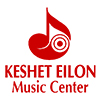Assaf Inbari, whom most of us know as a writer, will appear at Kibbutz Eilon’s Bar-Uryan Hall at 21:00 on May 17th in a joint literary and musical performance with Ariel Horowitz, entitled “Why Not Berlin.” In an interview with the Keshet Eilon website, he spoke about the relationship between music and literature and his connection with Horowitz.
– I know you as a writer. In Home you examined the kibbutz myth, and in The Tank you compared the stories of different people who all claimed to have stopped the tank at the entrance to Degania in the War of Independence. Do these stories find expression in your show with Ariel Horowitz?
Yes, of course. Our earlier show was a dialogue between Home and Ariel’s previous album, and our new show, similarly, is a dialogue between The Tank and his new album. Unlike the usual “encounter with an author” format, in which the musician just provides interludes of three or four songs, our performance is a truly egalitarian duet in which there is an organic connection between the literary and musical sections. It’s not just a shared performance, it’s a shared work of art born out of the intrinsic connection between our materials. We’re both around the same age, and we both have roots in the Jordan Valley. Ariel’s mother Naomi Shemer took part in the Degania fighting that I describe in The Tank, and her classmate and close friend Yehudit Berkowitch, who was also the girlfriend of Shalom Hochbaum, one of the main characters in The Tank, was killed in that battle. So emotionally we’re both from the same village, to quote Ariel’s mother.
– Nathan Shaham once told me that, had he not been a writer, he would have been a musician. How important is music to you?
Like the late Nathan Shaham, I, too, come from a background of classical music. Actually, I come from precisely the same place: when I was young I studied composition with Theodore Holdheim, who lived in the flat upstairs from Shaham on Beit Alfa. While I was learning to write chorales and fugues, Shaham was busy practicing his viola downstairs. But even back then writing books was my real passion, and by the end of high school I’d already given up music in favor of literature. However, my musical education didn’t go entirely to waste if I can play together with Ariel and our wonderful guitarist Roi.
– How did you team up for joint performances, and how do you work on them?
Ariel is actually a storyteller. Almost every one of his songs tells a brief story that keenly observes Israeli life, and he, too, like me, is interested in the founding generation and the roots of Israeliness. Our show opens with a song in which he describes the ingathering of the exiles that created Israeli society. The world of Home and The Tank is the world to which Ariel dedicated his theme album My Heroes, which includes, among other things, a song about Yosef Haim Brenner, a song about Abba Kovner, a song about one of the Bitaniya pioneers and a song about his grandmother, who was among the founders of Kvutzat Kinneret. For both of us, current events ride on top of history and the current situation sits atop the foundations of the past that we are seeking to reveal. That’s why the relationship between us is a natural connection between two artists who deal with the same fundamental materials, each through his own medium and in his own way. That’s why each one of us identifies so closely with the work of the other. This identification finds expression on stage when I talk about Ariel’s songs and play them together with him, and when he talks about The Tank and reads from it.
